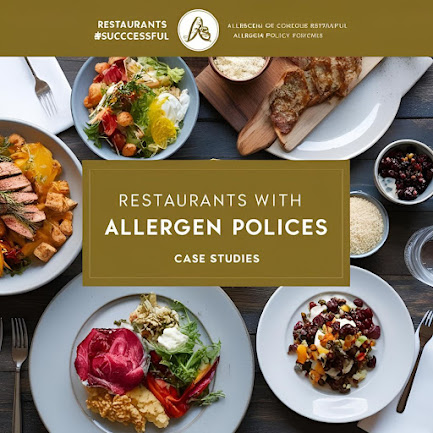Restaurants with Successful Allergen Policies: Case Studies
Restaurants with successful allergen policies prioritize customer safety by clearly identifying potential allergens in their menus. These establishments implement strict food handling procedures, staff training, and transparent labeling to prevent cross-contamination. Restaurants with successful allergen policies often work closely with suppliers to ensure accurate ingredient information. They also encourage open communication between guests and staff to address dietary restrictions confidently. This proactive approach builds trust with customers who have food allergies or intolerances. By prioritizing health and transparency, restaurants with successful allergen policies not only protect their patrons but also enhance their reputation and attract a wider, health-conscious audience.
Restaurants with Successful Allergen Policies
Managing food allergens is a critical responsibility for restaurants, as food allergies can lead to severe reactions, including anaphylaxis. Many restaurants have implemented robust allergen policies to ensure customer safety while maintaining high-quality service. Below are detailed case studies of restaurants with successful allergen management strategies.
1. Pret A Manger – Strict Allergen Controls & Transparency
Overview:
Pret A Manger, a UK-based international sandwich chain, faced scrutiny after customer fatalities due to undeclared allergens. Since then, they have overhauled their allergen policies to prioritize transparency and safety.
Key Allergen Policies & Practices:
Clear Allergen Labeling: All products display allergen information, including the "Big 14" allergens (EU-regulated).
Dedicated Allergen Training: Staff undergo mandatory allergen training, including cross-contamination prevention.
Separate Preparation Areas: Some locations have designated allergen-free zones for high-risk items.
Digital Allergen Menus: Customers can access detailed allergen information via QR codes and the Pret app.
"Nut-Free" Pledge: Most UK locations avoid peanuts and tree nuts in their kitchens.
Results:
Increased customer trust and reduced allergen-related incidents.
Recognized by allergy advocacy groups for improved transparency.
2. Chipotle Mexican Grill – Customizable & Controlled Allergen Options
Overview:
Chipotle is known for its assembly-line service, allowing customers to customize meals while accommodating allergies.
Key Allergen Policies & Practices:
Allergen-Specific Ingredient Lists: Online and in-store menus highlight common allergens (gluten, dairy, nuts, soy).
Gluten-Free Protocol: Separate utensils and gloves for gluten-sensitive orders.
Dedicated Allergen Training: Employees are trained to change gloves and avoid cross-contact.
"Allergen-Friendly" Options: Sofritas (vegan), corn tortillas (gluten-free), and dairy-free cheese alternatives.
Results:
A go-to choice for gluten-free and dairy-free diners.
Consistently praised for transparency in ingredient sourcing.
3. Legal Sea Foods – Rigorous Seafood Allergy Management
Overview:
Legal Sea Foods, a U.S.-based seafood chain, is highly regarded for its strict seafood allergy protocols.
Key Allergen Policies & Practices:
Allergen-Specific Menus: Separate gluten-free and shellfish-free menus.
Chef & Staff Training: Employees are trained to recognize and prevent cross-contact.
"Allergy Kits" in Kitchens: Dedicated cooking tools for allergen-free meals.
Direct Communication with Guests: Servers confirm allergies with kitchen staff before preparation.
Results:
Trusted by customers with shellfish allergies.
Rare reports of allergen-related incidents due to strict controls.
Overview:
Nando’s, a global peri-peri chicken chain, has a strong allergen policy catering to diverse dietary needs.
Key Allergen Policies & Practices:
Detailed Online Allergen Guide: Filters allergens (gluten, nuts, dairy) for each dish.
Dedicated Fryers: Separate fryers for gluten-free items (e.g., chips).
Allergen Icons on Menus: Clear visual indicators for common allergens.
Staff Allergy Training: Employees must pass allergen safety tests.
Results:
High satisfaction among gluten-free and nut-allergic diners.
Minimal cross-contamination incidents reported.
5. Disney Parks & Resorts – Gold Standard in Allergen Safety
Overview:
Disney’s restaurants (including theme park dining) are known for exceptional allergen accommodations.
Key Allergen Policies & Practices:
Allergen-Specific Menus: Options for gluten, dairy, nut, and shellfish allergies.
Chef Consultations: Guests can speak directly with chefs about allergens.
Dedicated Allergy-Friendly Kitchens: Some locations have separate prep areas.
"Allergy Bands" for Kids: Wristbands alert staff to allergies.
Results:
One of the safest dining experiences for food-allergic guests.
Consistently ranked as a top allergy-friendly destination.
Common Success Factors Across These Restaurants:
✔ Transparency – Clear allergen labeling and accessible information.
✔ Staff Training – Rigorous education on allergen handling.
✔ Cross-Contact Prevention – Dedicated tools and prep areas.
✔ Customer Communication – Encouraging guests to disclose allergies.
Allergy-sensitive meals are specially prepared dishes that exclude common allergens like nuts, dairy, gluten, or shellfish. They ensure safe dining for individuals with food allergies or sensitivities.
Conclusion
These case studies demonstrate that successful allergen policies require a combination of strict protocols, staff training, and clear communication. By adopting similar strategies, restaurants can enhance safety, build trust, and attract allergy-conscious diners.






Comments
Post a Comment